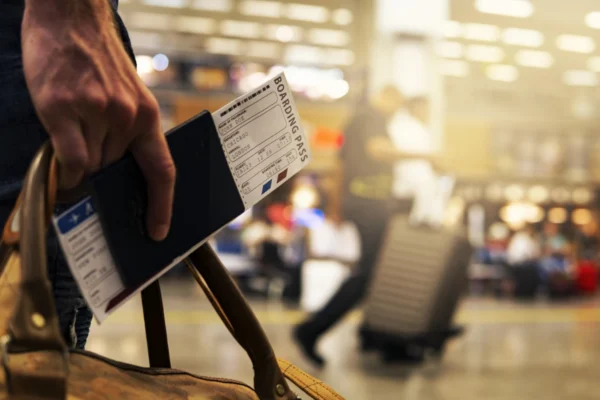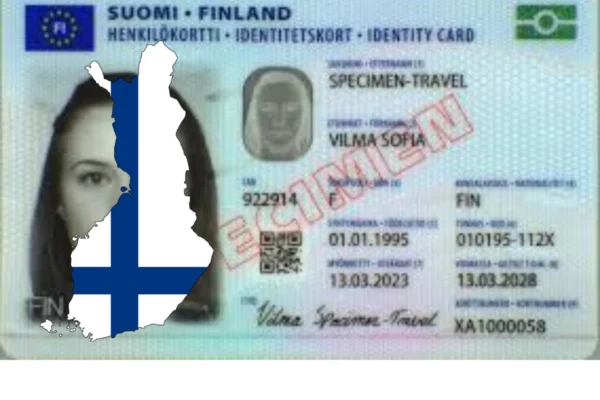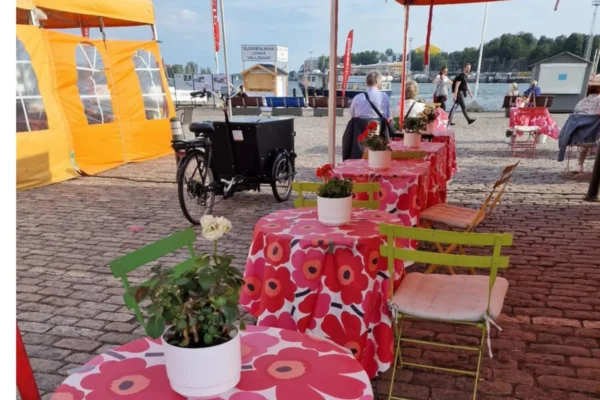Steps to Take from Arrival to Settling In
Move to Finland for Studies
Your Student Journey Starts Here
Immediately After Arrival

Our Story
Go Through Immigration & Border Control
Show your residence permit card or visa, passport, and letter of acceptance from your university.
Finnish immigration officers may check for proof of sufficient funds when students arrive in Finland to ensure they can support themselves during their studies. Students are generally required to demonstrate they have access to at least €6,720 per year, or €560 per month, to cover living expenses.
Our Story
Get to Your Accommodation
Whether it’s a student dorm, temporary stay, or apartment, make sure you check in and notify your host.
First Week To-Dos
Our Story
Register Your Address
Once you arrive in Finland, one of the first and most important steps is to register your place of residence with the Digital and Population Data Services Agency (DVV). This process is essential for accessing public services, healthcare, education, and official correspondence. Visit your local DVV office to submit your address registration and ensure your personal data is correctly entered into the Finnish Population Information System.
You’ll receive a personal identity code if you didn’t already get one with your residence permit.


Our Story
Apply for a Finnish ID Number
The Finnish personal identity number is a unique ID that is essential for everyday activities such as opening a bank account, accessing healthcare, signing rental agreements, and interacting with Finnish authorities.
To apply, you must visit the Digital and Population Data Services Agency (DVV) or the Finnish Immigration Service (Migri), depending on your situation.
Make sure to bring your valid passport or residence permit and any required documentation during your visit. Getting your ID number early ensures smooth access to all services and integration into Finnish society.
You can also apply online by following the official process provided here.
Our Story
Visit Your University’s Orientation
Be sure to attend the Orientation Week organized by your university, as it plays a vital role in helping you adjust to academic and student life in Finland. During this period, you will meet your International Student Coordinator, who will be a key support figure throughout your studies. They will provide important guidance on how to register for your courses, understand the academic calendar, and navigate your study program effectively.
You’ll also receive information about the wide range of student services available to you, including healthcare, academic advising, library access, IT systems, and support for housing or well-being. Orientation Week is also a great time to learn about Finnish education culture, university expectations, and how to get involved in student organizations or social activities. Participating fully will help you start your studies on the right track and feel more confident in your new academic environment.


Our Story
Get a Finnish SIM Card
Finland is to get a local Finnish SIM card, as having a local phone number is essential for many everyday tasks. Whether it’s opening a bank account, accessing public services, confirming your identity online, or simply staying connected with friends and university staff, a Finnish mobile number will make things much easier. Consider choosing from well-known mobile service providers such as DNA, Elisa, or Telia, all of which offer affordable prepaid and contract plans tailored to students and new arrivals. Most major providers have English-language customer service and offer easy setup either in-store or online. To purchase a SIM card, you’ll typically need to show your passport or residence permit, and some providers may require a Finnish ID number. Getting connected early will ensure smoother communication and access to important digital services during your stay.
Our Story
Open a Bank Account
Opening a bank account in Finland is an important step to help you manage your daily expenses, pay bills, receive your salary or student benefits, and settle into Finnish life smoothly. To open an account, you will typically need to visit a bank branch in person and provide the following documents: your valid passport, your Finnish personal identity number (ID number), proof of address in Finland (such as a rental agreement or DVV registration certificate), and a certificate of student status from your Finnish university if you are studying in Finland.
Several well-known banks in Finland offer services suitable for international students and newcomers, including Nordea, OP Financial Group (Osuuspankki), Danske Bank, and Säästöpankki (Savings Bank). These banks provide a range of account options, online banking in English, and in some cases, student-friendly packages with reduced fees. It’s a good idea to compare services and book an appointment in advance, as requirements and processing times may vary between banks and locations.

Health & Insurance

Our Story
Health Insurance Check
Before arriving in Finland, you are required to have valid health insurance as part of your residence permit or visa application. Make sure your insurance policy is currently active, covers you throughout your stay, and that you understand how to access healthcare services using it in Finland.
If you don’t already have suitable coverage or need to purchase a new policy, you can use the following link to find a cost-effective health insurance plan that meets Finnish immigration requirements
Our Story
Register at the Finnish Student Health Service (FSHS/YTHS)
If you’re enrolled at a university, you’re entitled to basic healthcare via FSHS. You also need to pay the healthcare fee via Kela.
Residence & Legal Stuff
Our Story
Register at the Local Police Station
Not always required now, but check if it applies to your case.
Our Story
Apply for a Travel Card (Bus/Metro)
As an international student in Finland, you are eligible for discounted fares on public transport, making commuting more affordable during your studies. Many cities—including Helsinki, Espoo, and Vantaa—offer reduced rates through local transit authorities.
In the Helsinki metropolitan area, students can apply for a HSL (Helsinki Region Transport) travel card, which provides significant discounts on buses, trams, metro, local trains, and ferries. To qualify, you must be a full-time student and provide a valid student certificate when applying for the discount.
These discounts help reduce daily travel expenses and are a great way to explore your city without stretching your budget.

Welfare Benefits for International Students
Finland is known for its strong social support system, and international students residing in the country may also be eligible for certain government-provided welfare benefits. These supports are designed to ensure well-being during studies, especially during challenging financial situations or while integrating into Finnish society.

Our Story
Social Assistance (Toimeentulotuki)
If your household income or assets are not enough to cover basic daily expenses such as food, rent, and healthcare, you may apply for basic social assistance. This benefit acts as a last-resort financial aid and is also managed by Kela. It is available regardless of nationality, provided you meet the residence and need-based criteria.
Our Story
Labour Market Subsidy (Työmarkkinatuki)
This subsidy is offered by Kela (the Social Insurance Institution of Finland) to support unemployed individuals who are actively seeking work.
If your spouse registered with the TE Office (Employment and Economic Development Office) and is participating in an integration plan—which may include attending Finnish language courses—you spouse may qualify for this financial support


Our Story
Child Benefit (Lapsilisä)
If you have children and live in Finland on a permanent basis, you may be eligible for child benefits provided by Kela, the Finnish Social Insurance Institution. This monthly financial support is designed to help families with the costs of raising children and is available for each child under the age of 17. The amount varies depending on the number of children in the family and other factors. International families may also qualify for these benefits, depending on their residence status and length of stay in Finland.
In addition to financial support, Finland offers free, high-quality education to all children, including those from international families. This includes comprehensive schooling, study materials, and school transportation where necessary.
What’s more, children attending school in Finland also receive three free nutritious meals a day—breakfast, lunch, and an afternoon snack—making Finland one of the few countries in the world to provide this level of educational and social support. This system ensures that all children, regardless of background, have equal opportunities to succeed and thrive in a safe and supportive learning environment.
